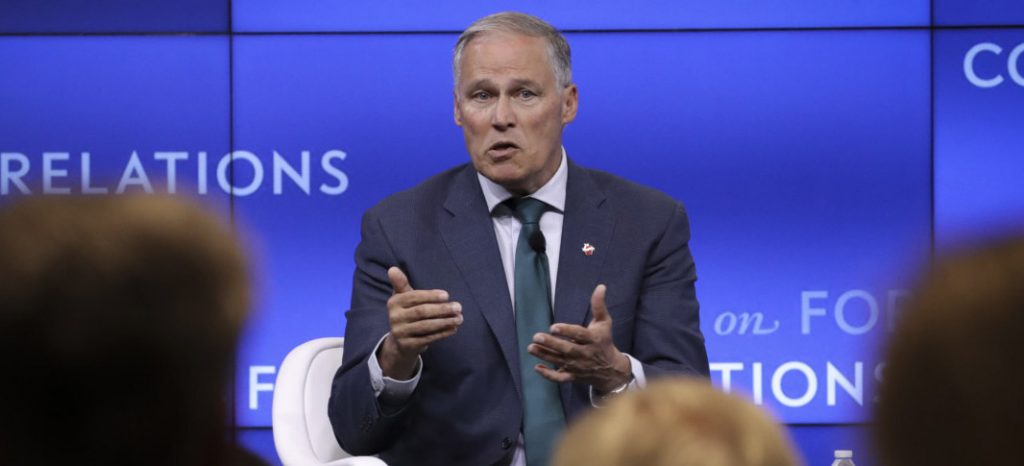
Democratic presidential candidate and Governor of Washington Jay Inslee speaks about climate change at the Council on Foreign Relations on June 5 in New York City. Photo: Drew Angerer/Getty Images.
Colombia Journalism Review
by Jason Plautz
CLIMATE CHANGE HAS BECOME A DEFINING ISSUE in the early Democratic presidential primary. But the Democratic National Committee has rebuffed calls to hold a dedicated debate on the topic, raising concerns that the issue will once more remain siloed during an election cycle.
DNC chairman Tom Perez wrote on Medium this week that the party wouldn’t acquiesce to candidates who wanted single-issue debates, although he said he has “made clear to our media partners that the issue of climate change must be featured prominently.” Perez, who served as Labor Secretary under President Obama, said he wanted to have candidates “engage on a range of issues that matter to the American people.”
But climate change wasn’t treated as just one “issue” during Obama’s presidency. It was spread out across the cabinet. The State Department, for example, negotiated the Paris Agreement, and the Transportation Department focused on the risks extreme weather posed to infrastructure.
As journalists and candidates seek to show that climate change is too vast to restrict to an environmental issue, there’s concern that the DNC’s decision is going the opposite way. By refusing to devote one night to an “issue that threatens to throw human civilization into crisis,” wrote New York Timescolumnist Justin Gillis, the DNC is enabling “another round of presidential primaries in which the climate crisis is basically hidden in the attic.”
Jay Inslee, the Washington governor and presidential candidate who led the calls for a climate debate, told Mother Jones that he would still participate in a separate climate debate despite apparent DNC threats to blacklist any candidate who did so (Perez has said candidates can participate in issue-based forums and town halls). “Sixty-second sound bites, which is all you’ll be able to get in a party debate, is grossly inadequate to the task,” he said.
Unlike previous elections, climate change tops voters’ concerns ahead of 2020; an April CNN poll of Democratic voters found that 82 percent listed climate change as “very important.” That should incentivize candidates to discuss climate change from as many perspectives as they can, Max Boykoff, director of the Center for Science and Technology Policy Research at the University of Colorado, Boulder, says.
“Climate change is an issue that cuts to the heart of how we work, live, organize ourselves, how we meet our needs every day,” Boykoff, the author of the upcoming book Creative (Climate) Communications, says. “Given the information we have, given the challenge we face, it’s insufficient to not have a dedicated debate to it.”
Dedicating a debate to climate change would elevate “the public’s awareness of the biggest story of our time,” Bobby Magill, a reporter at Bloomberg Environment and the president of the Society of Environmental Journalists, says in an email.
“There are so many climate-related issues at stake: The Green New Deal, which has become a GOP favorite subject of scorn, as well as carbon pricing, renewable energy, national security, rising seas, immigration and the future of fossil fuels,” he says. “Most of those issues affect everybody and are highly political.”
Campaigns are rarely the best venue for policy discussion, and party polarization means that a general-election debate over climate change effectively devolves into whether or not to trust the scientific consensus. But among Democrats, there is the chance for nuance. And while sixty-second answers won’t allow candidates to get far beyond the top-line goals of their climate-change plans, filling 90 minutes of debate time would force each to reckon with the differences between their plans, whether it’s the phase-out timeline for coal and natural gas, or how they would engage Congress in passing climate legislation. Elizabeth Warren could talk about how her public lands protection plan would limit fossil fuel drilling; Michael Bennet could offer more detail on his “Climate Bank” strategy to catalyze private investment. Read more …

